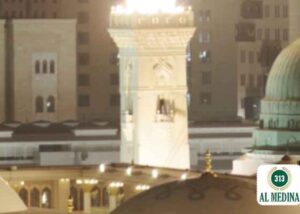How do you give Saalam to the Prophet ﷺ at the blessed grave? Do you say Ya Rasool Allah?
Quran
Hadith
Islamic Text
At the blessed grave of the Holy Prophet ﷺ you give Salaam directly to the Prophet ﷺ by saying ‘peace be upon you O Messenger of Allah.’ In Arabic: السَّلَامُ عَلَيْكَ يَا رَسُولَ اللَّهِ. This is established as the practice of Sayidina Abdullah bin Umar.
عَنْ مَعْمَرٍ، عَنْ أَيُّوبَ، عَنْ نَافِعٍ قَالَ: كَانَ ابْنُ عُمَرَ إِذَا قَدِمَ مِنْ سَفَرٍ أَتَى قَبْرَ النَّبِيِّ صَلَّى اللهُ عَلَيْهِ وَسَلَّمَ فَقَالَ: السَّلَامُ عَلَيْكَ يَا رَسُولَ اللَّهِ، السَّلَامُ عَلَيْكَ يَا أَبَا بَكْرٍ، السَّلَامُ عَلَيْكَ يَا أَبَتَاهُ
Nafi narrates that when Ibn Umar (May Allah Most High be pleased with them both) would return from a journey, he would come to the grave of the Prophet ﷺ and say, ‘Peace be upon you O Messenger of Allah. Peace be upon you O Aba Bakr. Peace be upon you my dear father.’ (Musanaf Abd al-Razaaq, 6724).
In the narration above we find Sayidina Abdullah bin Umar (May Allah Most High be pleased with them both) addressing the Holy Prophet ﷺ directly. He said, Asalaamu Aleyka Ya Rasool Allah السَّلَامُ عَلَيْكَ يَا رَسُولَ اللَّهِ, meaning ‘peace be upon you O Messenger of Allah.’ He also (May Allah Most High be pleased with him) addressed Sayidina Abu Bakr directly and his father Sayidina Umar directly. The narration above is authentic.
وروى عبد الرزاق بإسناد صحيح أن ابن عمر رضي الله تعالى عنهما كان إذا قدم من سفر أتى قبر النبي صلى الله عليه وسلم فقال: السلام عليك يا رسول الله، السلام عليك يا أبا بكر، السلام عليك يا أبتاه. (وفاء الوفاء)
Abd al-Razaaq narrated with a Sahih chain that when Ibn Umar (May Allah Most High be pleased with them both) would return from a journey, he would come to the grave of the Prophet ﷺ and say, ‘Peace be upon you O Messenger of Allah. Peace be upon you O Aba Bakr. Peace be upon you my dear father.’ (Imam Abu al-Hasan al-Samhudi, Wafa al-Wafa).
This narration is also found in the Musanaf of Ibn Abi Shaybah:
حَدَّثَنَا أَبُو مُعَاوِيَةَ، عَنْ عُبَيْدِ اللَّهِ، عَنْ نَافِعٍ، عَنِ ابْنِ عُمَرَ، أَنَّهُ كَانَ إِذَا أَرَادَ أَنْ يَخْرُجَ دَخَلَ الْمَسْجِدَ فَصَلَّى، ثُمَّ أَتَى قَبْرَ النَّبِيِّ صَلَّى اللهُ عَلَيْهِ وَسَلَّمَ فَقَالَ: «السَّلَامُ عَلَيْكُمْ يَا رَسُولَ اللَّهِ، السَّلَامُ عَلَيْكَ يَا أَبَا بَكْرٍ، السَّلَامُ عَلَيْكَ يَا أَبَتَاهُ»، ثُمَّ يَأْخُذُ وَجْهَهُ وَكَانَ إِذَا قَدِمَ مِنْ سَفَرٍ يَفْعَلُ ذَلِكَ قَبْلَ أَنْ يَدْخُلَ مَنْزِلَهُ
Nafi narrates that when Ibn Umar (May Allah Most High be pleased with them both) intended to leave (for a journey) he would enter the Masjid and pray. Then he would come to the grave of the Prophet ﷺ and say, ‘Peace be upon you O Messenger of Allah. Peace be upon you O Aba Bakr. Peace be upon you my dear father.’ Then he would leave. When he returned from a journey, he would do the same prior to entering his house. (Musanaf Ibn Abi Shaybah, 11793).
Based upon these narrations and other evidence the Hanafi scholars mentioned that one should give Salaam to the Prophet ﷺ directly when presenting it at the Mubarak grave.
ثُمَّ يَقُولُ فِي مَوْقِفِهِ: السَّلَامُ عَلَيْك يَا رَسُولَ اللَّهِ، السَّلَامُ عَلَيْك يَا خَيْرَ خَلْقِ اللَّهِ، السَّلَامُ عَلَيْك يَا خِيرَةِ اللَّهِ مِنْ جَمِيعِ خَلْقِهِ، السَّلَامُ عَلَيْك يَا حَبِيبَ اللَّهِ. (فتح القدير)
Then he says from his position of standing Peace be upon you O Messenger of Allah, Peace be upon you O best of Allah’s creation, Peace be upon you O the elect one from the entire creation of Allah, Peace be upon you O beloved of Allah. (Imam Kamal al-Deen ibn Humam, Fath al-Qadeer).
وَيَقُولُ: السَّلَامُ عَلَيْكَ يَا رَسُولَ اللَّهِ، السَّلَامُ عَلَيْكَ يَا نَبِيَّ اللَّهِ، السَّلَامُ عَلَيْكَ يَا صَفِيَّ اللَّهِ، السَّلَامُ عَلَيْكَ يَا حَبِيبَ اللَّهِ، السَّلَامُ عَلَيْكَ يَا نَبِيَّ الرَّحْمَةِ، السَّلَامُ عَلَيْكَ يَا شَفِيعَ الْأُمَّةِ، السَّلَامُ عَلَيْكَ يَا سَيِّدَ الْمُرْسَلِينَ، السَّلَامُ عَلَيْكَ يَا خَاتَمَ النَّبِيِّينَ. (الاختيار لتعليل المختار)
He says, Peace be upon you O Messenger of Allah, Peace be upon you O Prophet of Allah, Peace be upon you O the elect of Allah, Peace be upon you O beloved of Allah, Peace be upon you O Prophet of mercy, Peace be upon you O intercessor for the Ummah (nation), Peace be upon you O leader of the Messengers, Peace be upon you O seal of the Prophets. (Imam Kamal Abd Allah bin Mahmood al-Mowsili, al-Ikhtiyaar).
وَيُبَلِّغُهُ سَلَامَ مَنْ أَوْصَاهُ فَيَقُولُ: السَّلَامُ عَلَيْكَ يَا رَسُولَ اللَّهِ مِنْ فُلَانِ بْنِ فُلَانٍ يَسْتَشْفِعُ بِكَ إلَى رَبِّكَ فَاشْفَعْ لَهُ وَلِجَمِيعِ الْمُسْلِمِينَ. (الفتاوى الهندية)
He presents the Salaam of those who have asked him to do so saying, ‘Peace be upon you O Messenger of Allah from such and such son of such and such. He seeks your intercession with your Lord (Most High), intercede for him and the entire Ummah.’ (al-Fataawa al-Hindiyah).
And Allah Most High Knows Best.
-Answered by Shaykh Noorud-deen Rashid (27.02.2023)
See also:
Are the Prophets alive in their graves?
See also video:






